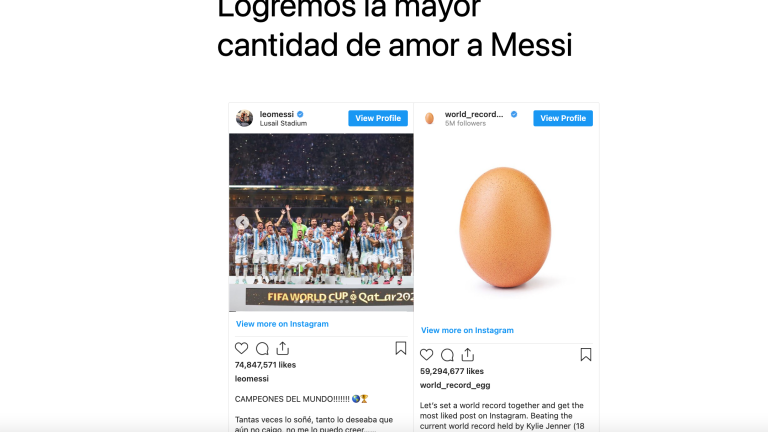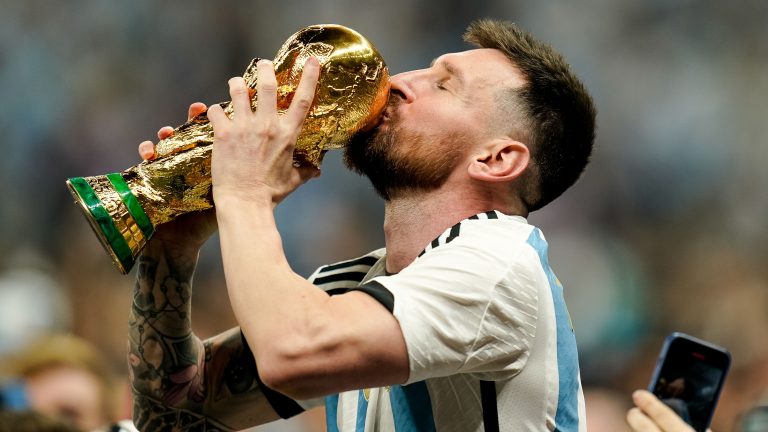After winning the World Cup, Argentina turned its energy towards making another piece of history: It campaigned to break a world record by getting a photo of Lionel Messi to beat an image of an egg as the most-liked post on Instagram.
On December 18, Argentina burst into football-fueled euphoria. Some climbed up the capital’s massive Obelisk, others got tattoos or ran naked through the streets, and everyone took to the internet to express their joy. But one of the many collective celebrations on social media evolved into a campaign to get Messi’s photo to break the Instagram world record. A day after Argentina won the World Cup, Messi’s post showing him kissing the World Cup trophy became the most-liked post on the social media platform, surpassing the number of likes on a rendered picture of an egg.
The campaign to beat the egg started when a 28-year-old journalist, Matías Mowszet, noticed that Messi’s photo was collecting “likes” at a breakneck speed — it had already become the second most-liked photo, and was only 11 million likes away from becoming the first. “If you liked this egg, unlike it,” tweeted Mowszet. He was driving home from work when his tweet linking to Messi’s post went viral. It was a few minutes before 1 p.m.
“It wasn’t meant to be a campaign,” Mowszet told Rest of World. “It was just a joke, but since it was right after we won the Cup, people were excited.”

Argentines organized sporadically as fans started to encourage friends and followers to unlike the “World Record Egg,” a parody account that had started as a joke to beat a post by Kylie Jenner in 2019.
By 8:30 p.m., the egg had lost 150,000 likes and Messi had gained 6 million more likes. Twelve hours later, Messi had beaten the egg. At the time of writing, Messi’s post stood at more than 74 million likes. What drove supporters to break the record at such short notice was connected to the whirlwind of passion and eccentricity that had followed Argentina’s World Cup triumph.
“It was a movement that sought to overthrow the status quo,” Mauricio Cabrera, an independent Latin American content creation specialist, told Rest of World. “But it was also a worldwide embrace of Messi [by his fans].”
As Mowszet’s tweet picked up steam, the team at Identidades Digitales, a marketing agency, decided to chip in. They created a website that tracked the likes on the Instagram posts of Messi and the egg. It allowed users to follow each photo’s progress, and made it easier for them to subtract their like from the egg and then add one to Messi's post. “It peaked at 6,000 users in real time and it had over 50,000 visitors during that week,” Juan Pablo Paradelo, the director of the agency, told Rest of World.
The movement created by Messi’s supporters spread across the world, inviting both support and backlash. As fans of Cristiano Ronaldo — who has a massive following on Instagram — found out that their favorite player had moved down to third place in terms of likes on the social platform, they started organizing to add likes to the egg, in hopes that Messi’s post would lose the record. The egg’s surge past the 55-million-likes mark that week can most likely be attributed to Ronaldo’s fans, said Cabrera.

The fact that the campaign was centered around Instagram was crucial, according to Cabrera. “Instagram is not like Twitter,” he said. “There are drives on both, yes, but on Twitter, bots are much more powerful and can have an impact on how things turn out in the end. On Instagram, at least in this case, there is no reason to believe any artificial users took part in the process. It was the fans, it was 100% the fans.”
Mowszet believes that what led supporters to engage in the campaign was linked to a deep-seated desire to be part of the triumph they’d seen on the football pitch. “It’s the dream of thinking that you can help,” he said. “That you can somehow contribute to your team’s victory.”



